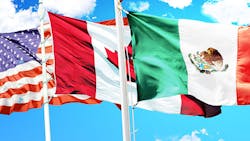NAFTA Negotiators Said to Agree to Regulatory Best Practices
Negotiators from the U.S., Canada and Mexico finished work on regulatory best practices for NAFTA, the first official “chapter” completed in the latest talks in Mexico City, according to a person with knowledge of the process.
The three nations had agreed to some similar measures on regulatory coherence as part of the Trans-Pacific Partnership, but the rules approved for the North American Free Trade Agreement go deeper, according to the person, who asked not to be identified before a public announcement and wouldn’t elaborate on the chapter’s specifics. U.S. President Donald Trump withdrew from that Pacific Rim pact a year ago, days after taking office.
In its negotiating objectives released in July, a month before NAFTA talks began, the U.S. Trade Representative’s office said that in regulatory best practices it would seek to ensure transparency and accountability in the development of regulations; provide meaningful opportunities for public comment; and promote impact assessments to ensure that regulations avoid unnecessary redundancies.
With the regulatory best practices chapter, on top of work on anti-corruption measures, rules for small- and medium-size businesses and for competition now done, it’s taken six months to complete four of the roughly 30 chapters likely to form the updated deal. Still, negotiators don’t see this as a negative: Important strides have been made on the remaining chapters and a deal could come together quickly once the most contentious issues are worked out.
Mexico and Canada began negotiating with the U.S. in August at the initiative of Trump, who’s repeatedly said the NAFTA accord led U.S. companies to fire workers and move factories to Mexico -- a “horrible deal” for the U.S. Trump has promised to negotiate a better deal for America or withdraw.
At the outset of the talks last year, optimistic assessments held that a deal could get done by the end of 2017. Officials later pushed that goal back to March -- a deadline that now looks almost impossible. The U.S. has complained that progress on its demands is too slow, and Trump has threatened to exit the pact.
The most contentious issues in the talks have included a proposal to require more auto manufacturing in the U.S., seasonal barriers to agriculture trade, access to U.S. procurement deals, dispute resolution mechanisms, and a clause that would terminate the deal after five years unless the nations agree to continue it.
Some NAFTA chapters involve a less controversial modernization of the 24-year-old deal, building off work from previously negotiated agreements like the TPP. Kenneth Smith Ramos, Mexico’s chief NAFTA technical negotiator, identified regulatory practices as one of these areas that the nation wanted to advance in this latest round of talks. The others were telecommunications; digital trade; technical barriers to trade; and measures to protect humans, animals, and plants from diseases, pests, or contaminants.
The media office of the USTR declined to comment. The press offices of the Mexican Economy Ministry and the press office of Canada’s Foreign Ministry didn’t immediately respond to a request for comment.
By Eric Martin
About the Author
Bloomberg
Licensed content from Bloomberg, copyright 2016.
